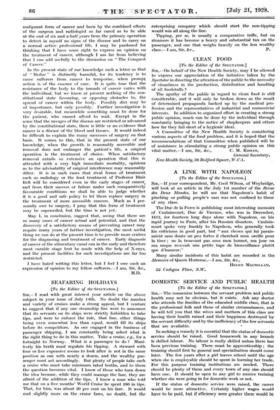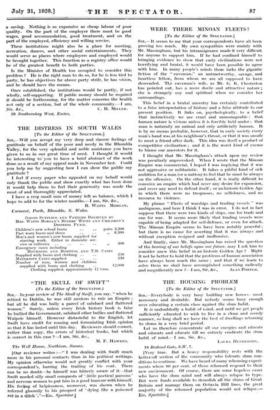DOMESTIC SERVICE AND PUBLIC HEALTH
[To the Editor of the SPECTATOR.] SIR,—The connexion between the servant problem and public health may not be obvious, but it exists. Ask any doctor who attends the families of the educated middle class, that is the professional folk and those of similar circumstances, and be will tell you that the wives and mothers of this class are having their health ruined and their happiness destroyed by the servant difficulty and by the inefficiency of the few servants
that are available. •
In seeking a remedy it is essential that the status of domestic service should be raised. Good housework in any branch is skilled labour. No labour is really skilled unless there has been previous training. There must be apprenticeship ; the training should first be general and specialization should come later. The few years after a girl leaves school until the age when she is employable should be spent in learning her trade. For this purpose training institutions are needed. There should be plenty of them and every town of any size should have one. It should be open to any girl to receive training whether she were going in for domestic work or not.
If the status of domestic service were raised, the career would be more attractive. Certainly higher wages would have to be paid, but if efficiency were greater there Would bb a saving. Nothing is so expensive as cheap labour of poor quality. On the part of the employer there must be good wages, good accommodation, good treatment, and on the part of the employed, efficiency and willing service.
These institutions might also be a place for meeting, recreation, dances, and other social entertainments. They would serve as places where employers and employed would be brought together. This function as a registry otyice would be of the greatest benefit to both parties.
Is the Minister of Health too occupied to consider this problem ? He is the right man to do so, for he is less tied to party, he has objectives far above party strife, he has vision, and he should have the means.
Once established, the institutions would be partly, if not wholly, self-supporting. If public money should be required -it should be forthcoming, for the matter concerns the health not only of a section, but of the whole community.—I am,





















































 Previous page
Previous page